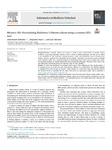BIcenter-AD: Harmonising Alzheimer’s Disease cohorts using a common ETL tool

Use este enlace para citar
http://hdl.handle.net/2183/37600
A non ser que se indique outra cousa, a licenza do ítem descríbese como Atribución-NoComercial-SinDerivadas 4.0 Internacional
Coleccións
- Investigación (FIC) [1728]
Metadatos
Mostrar o rexistro completo do ítemTítulo
BIcenter-AD: Harmonising Alzheimer’s Disease cohorts using a common ETL toolData
2022Cita bibliográfica
Almeida, J. R., Pazos, A., & Oliveira, J. L. (2022). BIcenter-AD: Harmonising Alzheimer’s Disease cohorts using a common ETL tool. Informatics in Medicine Unlocked, 35, 101133. https://doi.org/10.1016/j.imu.2022.101133
Resumo
[Abstract]: Background:
Many scientific studies have sought to obtain a better understanding of specific medical conditions. Concerning Alzheimer’s Disease, there is a lack of reliable diagnostics and this can be related to the availability of only small-scale ongoing biomarker studies and longitudinal cohorts including these subjects. Aiming to generate more substantial clinical evidence, researchers have started to perform multiple cohort analyses. While this is currently possible by harmonising these cohorts into a common data model, the migration pipelines are usually implemented using programming languages. Therefore, cohort owners may have difficulties contributing during the validation stage of these pipelines.
Results:
To reduce the dependency on technical teams’ support when validating the data transformations, it is proposed the use of an ETL tool with visual features. BIcenter is a collaborative web platform designed to implement ETL tasks through the browser. These pipelines are constructed using drag-and-drop features and intuitive forms to customise the ETL steps. This tool is an open-source project and is accessible at https://bioinformatics-ua.github.io/BIcenter-AD/.
Conclusions:
Our methodology produces interoperable cohorts for multicentric disease-specific studies. Therefore, the tool was validated using Alzheimer’s Disease cohorts from several countries, combining at the end 6,669 subjects and 172 medical attributes. The harmonised cohorts now enable multi-cohort querying and analysis, helping in the execution of new studies.
Palabras chave
Clinical studies
Data harmonisation
ETL
OMOP CDM
Alzheimer’s disease
Data harmonisation
ETL
OMOP CDM
Alzheimer’s disease
Versión do editor
Dereitos
Atribución-NoComercial-SinDerivadas 4.0 Internacional
ISSN
2352-9148






